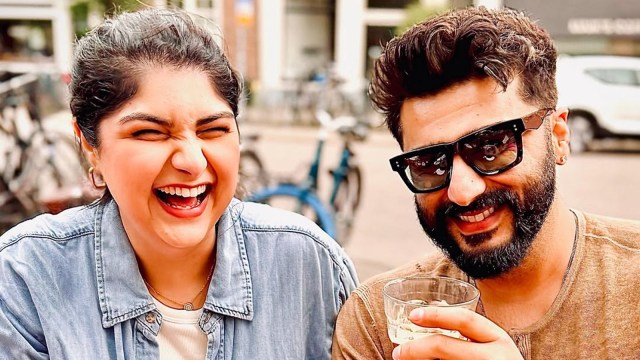📣 For more lifestyle news, click here to join our WhatsApp Channel and also follow us on Instagram
‘He hasn’t had a single year that’s been smooth’: How Anshula Kapoor’s appreciation of brother Arjun’s strength highlights the unseen cost of resilience
When asked to describe Arjun’s life using a film title, Anshula chose Gladiator, explaining, “People underestimate how much s**t and crap you’ve had to go through and still come out on the other side.”
 Anshula Kapoor offered a rare and heartfelt tribute to her brother and actor Arjun Kapoor (Source: Instagram/Anshula Kapoor)
Anshula Kapoor offered a rare and heartfelt tribute to her brother and actor Arjun Kapoor (Source: Instagram/Anshula Kapoor)Resilience can often go unnoticed — especially when it’s worn quietly and without complaint. Entrepreneur Anshula Kapoor offered a rare and heartfelt tribute to her brother and actor Arjun Kapoor recently through a video filled with inside jokes, thoughtful reflections, and affectionate admiration. While the two shared a lighthearted exchange, Anshula’s deeper words left a lasting impression.
When asked to describe Arjun’s life using a film title, she chose Gladiator, explaining, “People underestimate how much s**t and crap you’ve had to go through and still come out on the other side. You never let down the people you love. You’ve carried burdens since you were 10, and not once have you given up.”
She called him “fiercely loyal, resilient, and misunderstood,” adding, “He hasn’t had a single year that’s been smooth. For 30 years, it’s been one fight after another. But he’s still standing tall. That’s why he’s a gladiator.” In her caption, she wrote, “We fight. We laugh. We hype each other up.”
But why are some individuals more prone to being misunderstood, especially when they don’t openly share their emotional struggles?
Psychologist Anjali Gursahaney tells indianexpress.com, “Some individuals are more likely to be misunderstood simply because they don’t articulate their inner world out loud. When someone chooses to keep their emotional battles private—whether due to personality, past trauma, or fear of being judged—others often make assumptions based on surface-level behavior. In a world that tends to value visible vulnerability and emotional expressiveness, quiet strength can be mistaken for emotional detachment, arrogance, or aloofness.”
View this post on Instagram
She adds that people who internalise their pain rather than vocalise it often navigate deep emotional landscapes independently. But because they don’t invite others in, their struggles remain invisible, and that invisibility is where misunderstanding festers. “We live in a culture that frequently misjudges what it cannot immediately see or label. As a result, many emotionally deep or introspective individuals carry the double burden of their internal struggles and the external misinterpretation of who they are,” she states.
How does early emotional responsibility shape one’s ability to cope and stay emotionally available for others later in life?
“When someone carries emotional responsibility from a young age — whether it’s due to family trauma, loss, or instability — they are often forced to develop maturity before they’re emotionally ready,” explains Gursahaney. She notes that this premature emotional labour builds resilience and grit, but it also rewires how they relate to their own needs and those of others. People who grow up this way often become incredibly dependable and loyal; they are the ones others can always lean on.
“However, their own emotional needs often get sidelined. Over time, this can lead to hyper-independence, where asking for support feels unnatural or unsafe. While they may appear emotionally available, they might struggle with true vulnerability because their early experiences taught them that their job was to hold everything together, not to be held. In adulthood, this can manifest as being there for others while secretly feeling unseen or emotionally exhausted. Essentially, early emotional responsibility creates emotional strength — but at the cost of one’s own emotional softness, which they may have to learn to reclaim later in life,” Gursahaney mentions.
📣 For more lifestyle news, click here to join our WhatsApp Channel and also follow us on Instagram





- 01
- 02
- 03
- 04
- 05






















